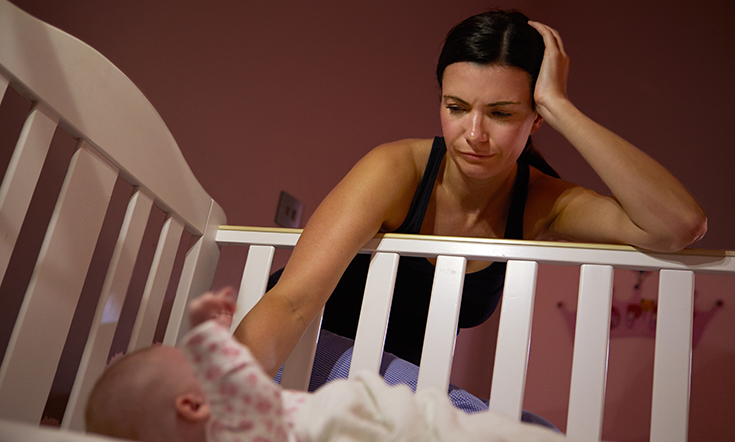

Babies are constantly developing, even when they sleep. They are busy making sense of and giving meaning to their experiences. This is an ongoing process and their brain develops in response to experiences. Once your baby reaches four months of age, you might find that the lovely sleep routine you’ve established has suddenly gone backwards. There is a reason for this, and it’s perfectly normal.
The body and brain of the baby builds like building blocks, one phase of development, is required before they can move into another. For example, to roll over, a baby must have the development of muscles and nerves to make that possible, and then these skills need to coordinate with the brain. When you see your baby roll over, it may well look like an accident to you, but it is a well coordinated effort between body and brain. This is a massive effort for a young baby.
As one thing becomes organised in the brain, it triggers the next step in development. During the first three months of life babies live mainly by reflex, with most functions coming from the lower part of their brains. As the months pass, higher regions of the brain start working and by four months your baby is an amazing little system in action. Their capacity for voluntary action is growing every day.
Babies are not just physically progressing, they are also developing socially and emotionally. The difference between a baby at two months and a baby at four months is significant. At two months your baby will smile at you, but by four months they will hold your eye contact and show you they are entranced by you. They will look around the room, meet your gaze and talk to you with their eyes. This is a time when your baby is making sense of the world around them. With that new meaning comes natural exploration, because their eyes are able to focus more, making distance vision possible.
The development shifts that occur between two and four months are significant and often leads to changes in sleeping habits. This is a sign of your baby’s physical, social and emotional worlds reaching new heights. Their sleep may be more disrupted, but it is a result of amazing mastery in other spheres. So while the changes in sleeping patterns can be challenging for the care-giver, they are a sign of development.
It is important to stay calm in the face of this change, even if you feel a little panicked. Life has changed, but longer sleeps with less resistance to separation from you will not last forever. Sleep will happen again if you stay calm and kind. This is definitely NOT a time to consider sleep training. Your baby is undergoing enormous growth where they need additional support to adjust to this new and possibly overwhelming world; it is no time for training.
How You Can Help Your Baby Sleep at Four Months
Your baby needs cuddles to calm and soothe them. When they are distressed they need comforting. When they are calm, you can leave them. Your baby may need extra care during this time, but it’s important to remember that it is a phase.
Watch for your baby showing tired signs and then help to calm them in readiness for sleep. Your baby may wake more often, especially overnight. Continue to offer comfort and if necessary, a feed. If you support your baby through this phase, after a couple of weeks, you will notice they will calm in your arms and then transition to being in their sleep place with less distress.
Babies become increasingly mobile at this time, so when they finally do get to sleep, they may wake themselves when moving around. If that is the case, you don’t always have to re-position them so they can return to sleep. Comforting a baby in the position they have found is more likely to result in them adjusting to the new positioning.
This is a really important time to be sure your baby is sleeping in a safe place, safe from any risk of accidents that can be caused by soft, untucked bedding. A sleeping bag with arms out, is a safe option, especially once baby begins to move more. If you are unsure, read more on safe sleeping here. Your baby will bump into the sides and top of the cot, but will soon learn not to, so avoid the urge to use padding or bumpers because they can prove more of a risk than a help. This will settle down as your baby adjusts to the enormous developmental shift they are experiencing. It happens progressively for some, and quite quickly for others. The speed at which they adjust can depend on the baby’s temperament and how parents care for their baby during this time.
Disruption to Feeding
If you experience disruptions to feeding at this time it doesn’t mean you need to change feeding or consider weaning. It can be worthwhile focusing more on feed times. Some babies require more feeds through this phase. At four months babies need more help to reduce distractions because their development allows more into their world view. To help a baby settle in for a feed you may need to either darken the room or maybe sit in a quiet space free of toys or distractions.
Being able to purposefully reach may result in your baby moving their hands around while they feed. Gently holding that ‘roaming’ hand helps them to bring their focus back to the feed.
So while it may feel like sleep regression, it is your baby showing you that they are growing, developing and progressing exactly as they should be.
If you are having trouble with your baby sleeping and need Expert help see my Facebook page or website link























